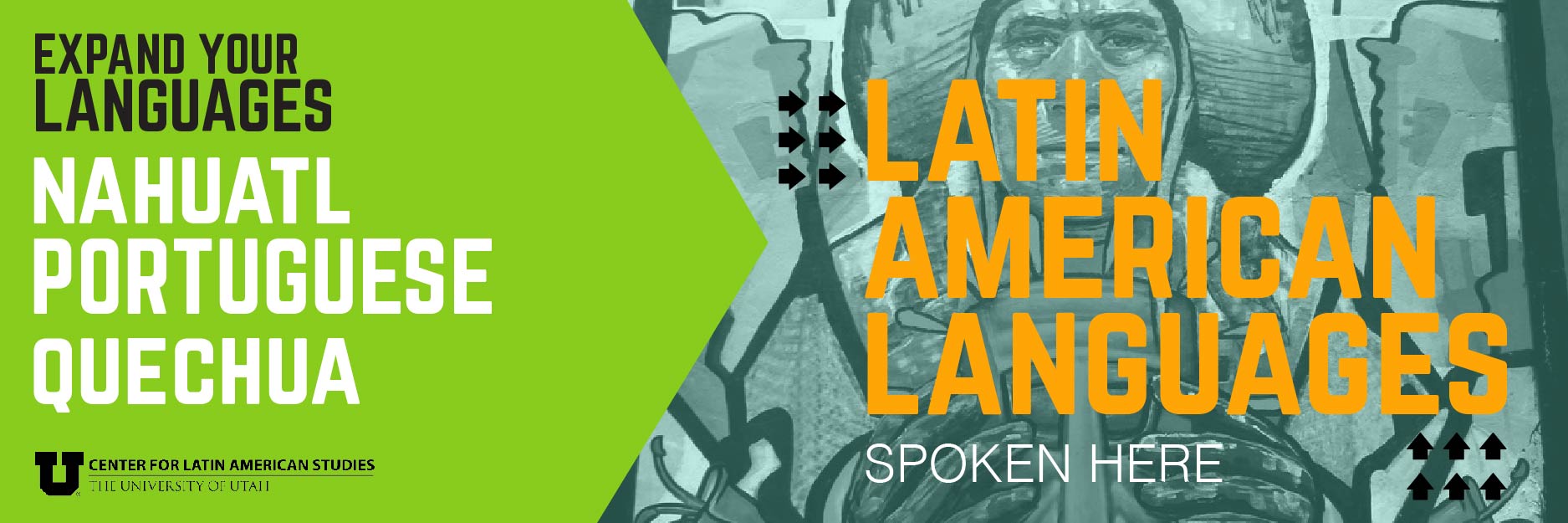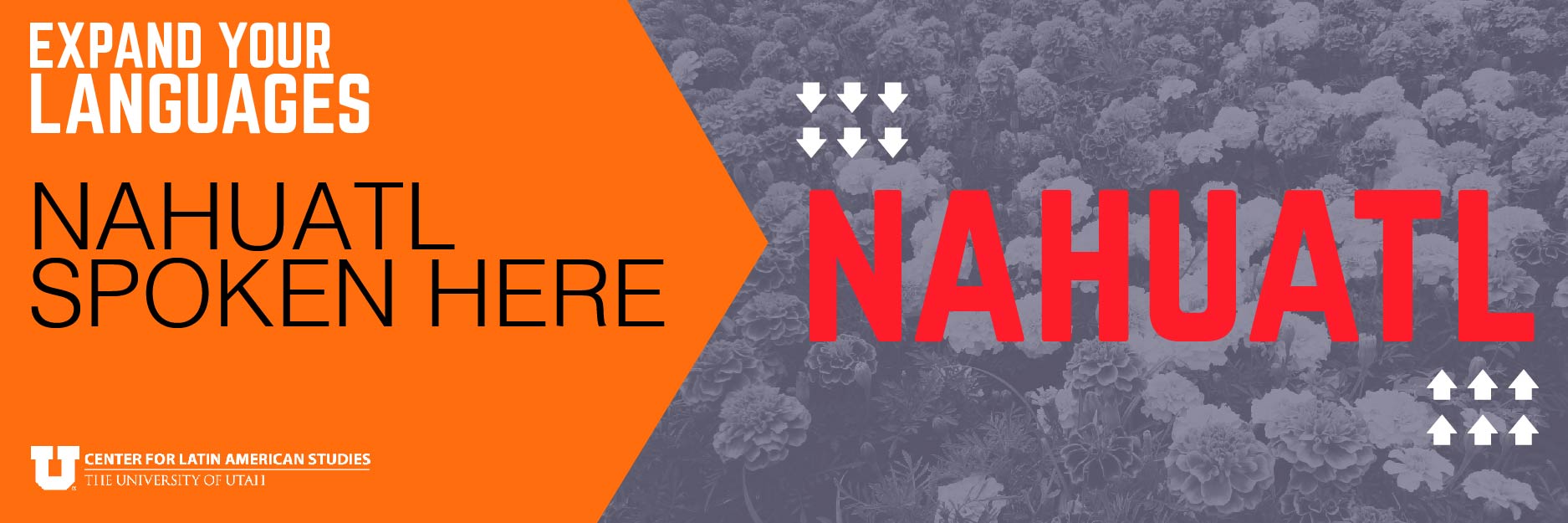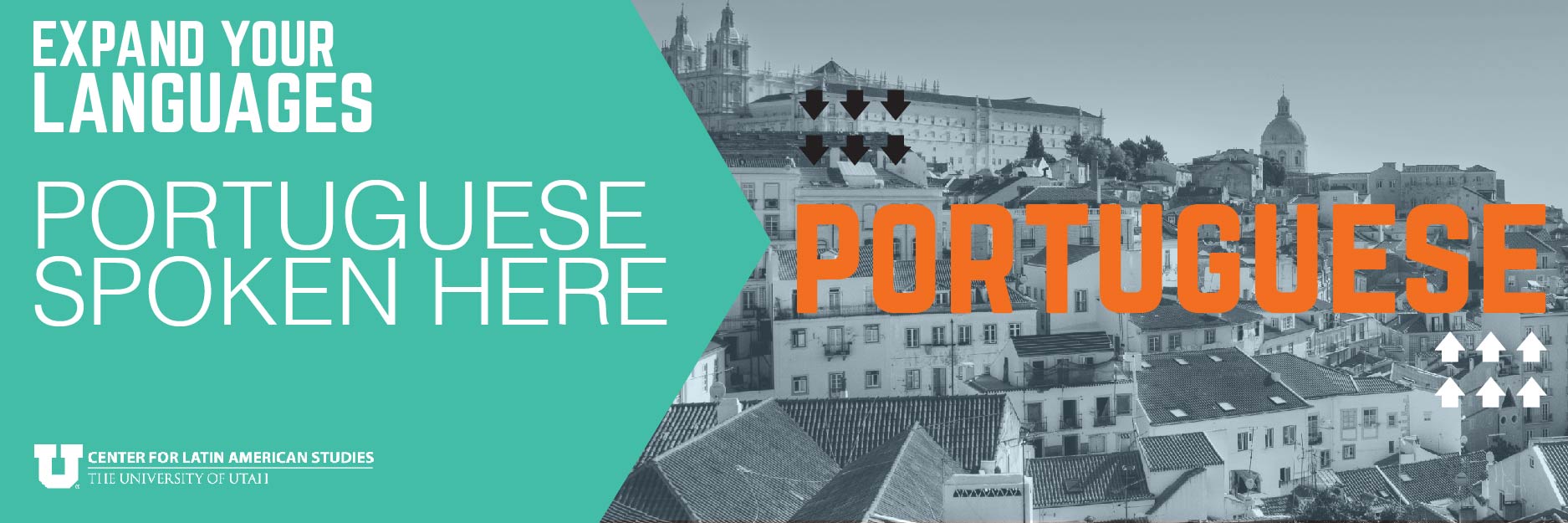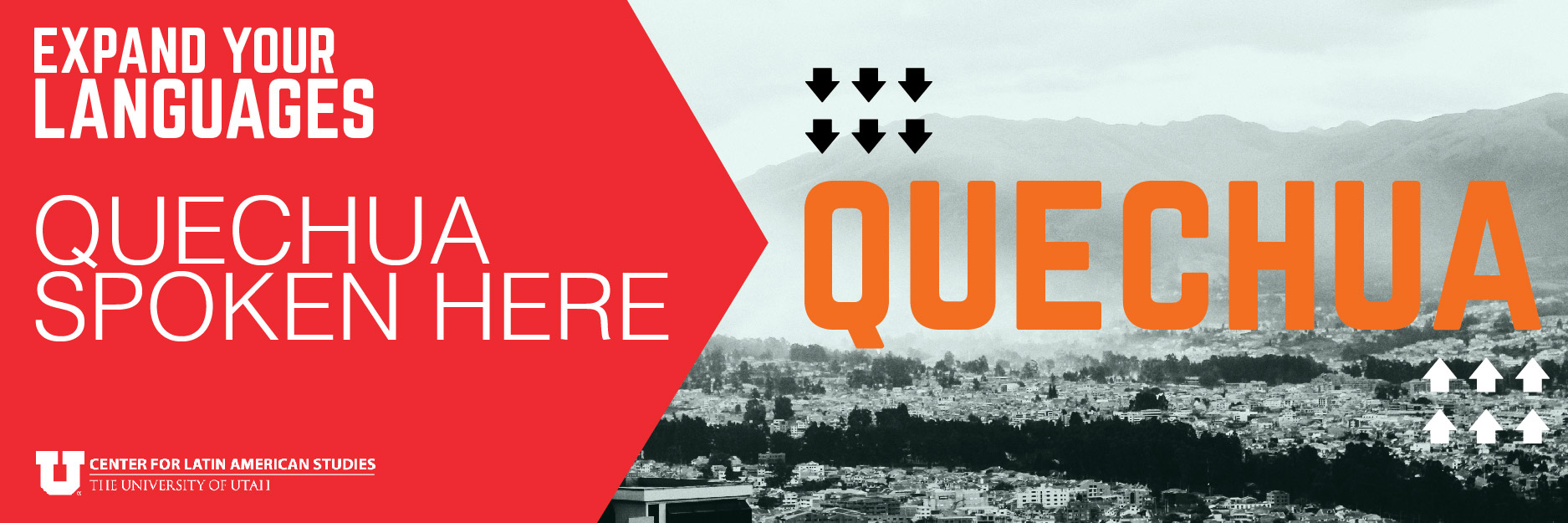Languages Offered
Languages & Indigenous Languages of Latin America
Latin America is one of the most linguistically diverse regions in the world. In countries like Bolivia and Paraguay, and in large areas of Peru, Ecuador, Guatemala and Mexico, the majority of people speak a first language other than Spanish. An estimated 40 million people in Latin America speak an indigenous language; Quechua alone accounts for about 10 million speakers. The Department of Languages and Literature offers instruction in two indigenous languages of Latin America: Ecuadorian Quechua and Nahuatl (Aztec), spoken by over 1 million in Mexico today.
Visit the Department of World Languages and Cultures for information on majors and minors in these languages.




Latin American Languages Taught at the U
Nahuatl is among the 68 living Indigenous languages officially recognized by the Mexican government and has the most speakers, approximately 1.4 million. Nahuatl is part of the Uto Azteca language family, one of the largest language families in the Americas spanning the Western United States and Mexico.
Common words used in everyday English such as chocolate, chili, tomato, avocado, and coyote all derive from Nahuatl. The courses are taught by native-language speakers from the Instituto de Docencia e Investigación Etnológica de Zacatecas (IDIEZ) in Mexico through a distance-learning format i.e. video conferencing.
IDIEZ instructors teach modern Nahuatl spoken in the Huascteca Veracruzana. Nahua culture, history and modern life are at the center of Nahuatl language instruction. Classes are offered at beginning, intermediate and advanced levels. Though knowledge of Spanish is not required, it is helpful as the native language instructors present grammatical explanations in Spanish.
These courses introduce students to a variety of Quechua/Kichwa dialects spoken by indigenous peoples living in the Amazon and Andean regions of Ecuador. Scientific and environmental themes provide insight regarding the ways of living and representing the world embedded in the language.
Students will engage in local knowledge and Kichwa narratives about glaciers, climate change, animals, and plants. Quechua/Kichwa is taught by a native-language speaker at the University of Wisconsin Madison through a distance-learning format i.e. video conferencing.
As a designated National Resource Center for Latin American Studies, the University of Utah is pleased to offer a Minor in Portuguese & Brazilian Studies, an MA in Portuguese Language Pedagogy, and an MA in Latin American Studies with a focus on Brazil.
Portuguese is a truly global language. With more than 240 million speakers spread across every continent, it is the 6th most widely spoken language in the world — more people speak Portuguese than French, German, Italian, or Japanese. It is the official language of Angola, Brazil, Cape Verde, Guinea-Bissau, Portugal, São Tomé and Príncipe, and Mozambique; it also retains a historical presence in Macau (China), East Timor (Southeast Asia), and Goa (India).
In addition, there are large communities of Portuguese speakers in many other countries. Over a million citizens of the United States are native speakers. In Utah alone, more than thirty thousand people speak Portuguese.
The program in Spanish provides students with the skills necessary for in-depth research in Latin-American and Spanish Literature. Students become well versed in the traditional canon, advance their critical thinking skills, and explore a variety of analytical and theoretical paradigms. The program offers a wide range of seminars in Golden Age, Modern Peninsular, Colonial Latin American, Caribbean, Contemporary Latin American, and U.S. Latina/o studies, as well as Spanish Linguistics. Specific approaches include cultural theory and intellectual history, post-colonial studies, queer aesthetics, avant garde aesthetics, and popular culture, as well as film and visual studies. Seminar topics range from Indigenous voices, travel literature, and sociolinguistics to studies in race, gender and genre.
Get Started
There are Many Reasons to Study Languages
Personal Interests
Are there certain countries or regions of the world that particularly fascinate you,
that you would like to know more about, or that you could see yourself spending time
in? Are there important people in your life from other countries or regions of the
world with whom you would like to be able to better communicate? The ability to converse
in the common language of others can break down cultural barriers and help you understand
their history, attitudes, and beliefs.
Academic Interests
Are there certain writers whose work you would like to read in the original? Is there
scholarly literature in a discipline of interest that can only be read in another
language? Are there news sources in other languages that you would like to be able
to understand? In every academic discipline, there have been great thinkers, scholars,
and artists who have made significant contributions that have either not been translated
into English, or whose work is inadequately rendered in translation. Ask professors
what languages they believe are important for further study.
Career Goals
Are there regions of the world where you wish to work? Are there languages important
to the industry or career field where you would like to work? Investigate the desired
languages of government agencies, companies, and organizations where you wish to work
in the future.
Ways to Study Any of our Offered Languages
- Declare a minor, major, MA, or PhD in any or multiple of our offered languages or language study programs
- Practice your skills outside of the language classroom and take a CLAC section
- Take courses through the BYU Center for Language Study (CLS)
- Complete a study abroad!
Cultures and Languages Across the Curriculum (CLAC)
The CLAC model is built on the premise that knowledge of other languages affords unique access to multiple cultures and their perspectives. Often referred to as intercultural competence, this understanding of different cultures, including one’s own, is critical for students to succeed in today’s global world. The ability to communicate in another language and with other cultures is typically associated with foreign language degrees and immersive experiences abroad. However, to make the achievement of intercultural competence possible for all students, CLAC programs integrate different languages and cultures into a variety of curricular contexts beyond the traditional foreign language classroom. This integration of language and content can take different forms: a content course, for example Democracy in Latin America or The History of Brazil that is linked to a special section, or trailer, in which students read and discuss material in the second language; a class, for example, Rainforest Ecology, taught entirely in Spanish or Portuguese; or a course, for example International Management, in which students complete written assignments in the target language, based on non-English reading materials.
Learn About the Opportunities that are Available at the U
We offer many career-building opportunities, including international study abroads, research and post-graduation opportunities, internships, and more! You can also click below to see more reasons why studying language(s) makes you a hugh asset in any job field you choose to pursue.
Benefits
The American Council on the Teaching of Foreign Languages (ACTFL) identifies three main benefits to learning foreign language found in scholarly research:
- Higher Academic Achievement
- Improves Cognitive Abilities
- Positive Attitudes and Beliefs about other Cultures
The Job Market
CNNMoney
"The hottest job skill is..."
Chicago Tribune
"Bilingual-jobs: Foreign-language careers on rise"
International Business Times
"Foreign language skills provide sharp edge in the job market"
American Councils for International Education
"Five Ways to Make a Difference Using Your Language Skills"
Scholarships
Scholarships for students declared as language majors
Learning Abroad: Scholarships for intensive language programs
FLAS: Foreign Language and Area Studies (FLAS) Scholarships

